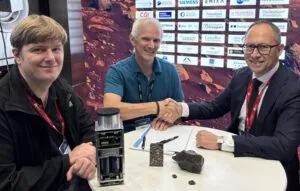Magdrive, the developer of high-performance plasma propulsion for spacecraft, will be working with with Perpetual Atomics, the company behind space nuclear power systems.
They aim to integrate space-grade radioisotope power systems with plasma propulsion. This could unlock a step-change in performance for long-duration space missions. For example, supporting deep space exploration, defence and security applications, and Earth-Moon infrastructure development.
The MoU commits both sides to share data and “explore technology integration” – to share technical progress and pursue joint opportunities. This is with a view to jointly developing and demonstrating viable nuclear space propulsion, which has not been done to date. The agreement formalises the existing relationship, following nearly a year of behind-the-scenes collaboration.
The signing also follows the successful launch of Going Rogue, Magdrive’s first in-orbit propulsion test.
Next big thing
 “For decades, nuclear propulsion has been the next big thing,” said Magdrive’s Co-Founder and CEO, Mark Stokes, right. “But it’s stayed in the realm of papers and proposals.”
“For decades, nuclear propulsion has been the next big thing,” said Magdrive’s Co-Founder and CEO, Mark Stokes, right. “But it’s stayed in the realm of papers and proposals.”
“We believe combining two UK technologies, our compact high-thrust propulsion system and Perpetual Atomic’s space radioisotope power units, can finally make it fly. Literally.”
Perpetual Atomic’s headquarters are in Space Park Leicester and Magdrive’s in the Harwell, Oxfordshire.
“The UK has a golden opportunity to lead in nuclear-electric propulsion,” added Dr Adam Baker, Special Projects Director at Magdrive. “This isn’t just about going further into deep space. It’s about staying there.”
“It means longer missions in cislunar space, persistent defence capabilities, and commercial operations that don’t have to rely on sunlight to function. The core technologies already exist, they’re proven, low-risk, and ready to work together to create a truly game changing capability.”
Radioisotope
For its part, Perpetual Atomics highlighted the size of the prize, in terms of the wider market for radioisotope power.
“Perpetual Atomics is excited to be working with Magdrive to advance space nuclear propulsion,” said Professor Richard Ambrosi, Co-founder and Chief Scientific Officer of Perpetual Atomics.
“Combining our compact, efficient and scalable americium-241 nuclear power units with Magdrive’s propulsion tech, we can enable long-endurance, high-agility missions that would be impossible using solar power alone. It opens a dramatically wider market for radioisotope power funded to date through a successful partnership between the UK Space Agency and ESA.”
Experience
Perpetual Atomics has experience developing heat and power units for ESA science missions, which are scheduled to launch this decade.
Magdrive, recently launched two plasma propulsion units for in-orbit testing aboard the Transporter-14 mission. And it has more in the pipeline.
Back in 2022, Magdrive and the University of Southampton were investigating the feasibility of the Plasma thruster based Automated Deorbiting-Block (PAD-B) system.
The company was also chosen by Amazon as one of the top startups for its 2022 AWS Space Accelerator programme
More recently, in March 2025, the company raised $10.5 million in seed funding for its novel propulsion system. The investment will be used to drive R&D, build a manufacturing facility in the UK, and establish a US office.
Magdrive Rogue Thruster
Magdrive is developing its satellite propulsion system, Rogue Thruster. In contrast with current propulsion systems, it uses metal propellant.
The company highlights that the system enables high cadence avoidance manoeuvres with extremely low volume and mass. With the ever increasing number of satellites in orbit – 100,000 within five years, it quotes – the agility and manoeuvrability needed to avoid collisions in space will also increase.
Also, potentially, its sourcing could be in-space, says the company.

